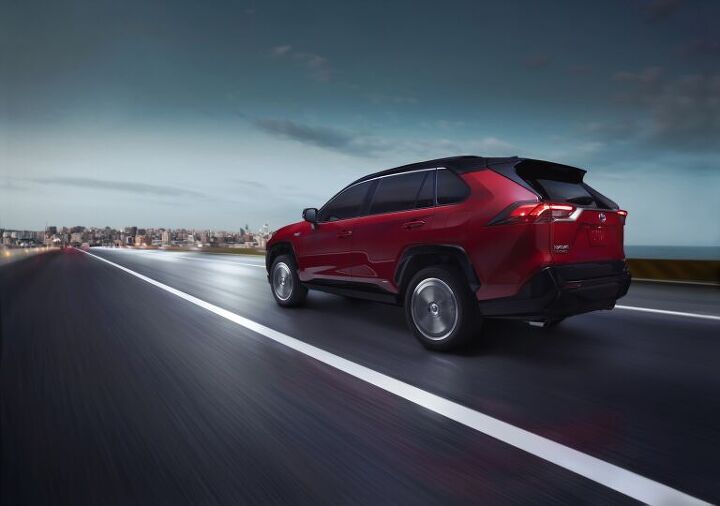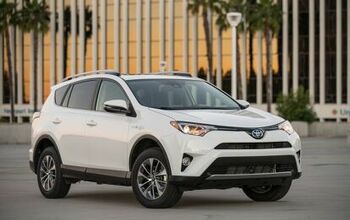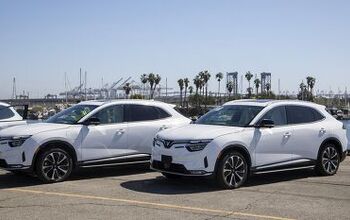Toyota Prices Its RAV4 Prime, the Crossover With a Plug

By bestowing a name once associated with the Prius on its top-selling RAV4 crossover — while adding beefed-up electric motors, battery pack, and charging port for good measure — Toyota catapulted the compact CUV’s power and price.
For those looking to get off the line in a hurry while using less fuel, what kind of pocketbook pain awaits them in a new RAV4 Prime?
An easy question to answer, now that Toyota has revealed pricing for the plug-in hybrid arriving this summer. After destination, a “base” SE goes for $39,220. For that sum, buyers will find 302 combined horsepower on tap from a 2.5-liter four-cylinder and electric motors fore and aft, a zero-to-60 time of 5.7 seconds, and 42 miles of gas-free range drawn from a 17.8 kWh battery pack.
It’s the quickest RAV4 in the model’s long history, Toyota claims, beating even the defunct previous-gen V6 model. And it’s not cheap, either, as the well-equipped uplevel XSE trim carries a sticker of $42,545.
Of course, that MSRP does not take into account the $7,500 federal tax credit available for plug-ins with batteries of 16 kWh or greater. That shaves off quite a bit, bringing the RAV4 Prime’s base price much closer to the entry level LE Hybrid model, which (for 2020) starts at $29,470 after destination. That’s a lower-trimmed vehicle with no legit EV mode. Add state-level green vehicle incentives into the mix, and the RAV4 Prime could start looking like a bargain.
You’ll be able to tell the two trims apart by their standard content. Whereas the SE sees 18-inch wheels and an 8-inch touchscreen, the XSE bumps both wheel and screen size up an inch.
With its RAV4 line, Toyota already had both the best-selling compact CUV on the market and the hottest hybrid (eco-conscious crossover shoppers long ago left the once-revered Prius in the dust). With this PHEV variant, Toyota completes the trifecta, making up, somewhat, for its lack of a fully electric vehicle.
[Image: Toyota]

More by Steph Willems
Latest Car Reviews
Read moreLatest Product Reviews
Read moreRecent Comments
- MaintenanceCosts "While there are absolutely exceptions, the days of the super-sleazy used car dealer seem to be behind us here in the States."Citation needed.
- SCE to AUX Sounds like the written-off cars didn't even have enough life in them to survive the short warranties. The scheme would have lasted longer if the cars were sold as-is.Is "written off" similar to an "R" or "S" title in the US?
- AZFelix Not enough charging stations. Long wait times. Do not recommend.
- 2ACL I love the CV6 + stick pairing, even if it's not particularly quick (or efficient) by modern standards. It looks to have a solid foundation and would be nice to drive fully sorted, but Honda/Acuraphiles seem more interested in ressurecting second generation cars. I wanted a manual GS sedan for the longest time, though I'd have gladly taken a first generation manual coupe. Thankfully, we're spared of 'future collectable' pricing with this one.
- Buickman forget 5G, WiFi, microwaves, smart meters, and Bluetooth. (fluoride, chemtrails, clot shots)what does riding on a giant battery with ultra magnetic frequency do to your innards?oh, so an EV works for you not venturing far? YOU'RE NOT USING GAS!THERE'S NO FOOD IN THE DESERT!




































Comments
Join the conversation
Seems like a great vehicle for a 1-car family. Quick, practical, refined, affordable, and you can charge at home but never HAVE to charge on the road. People don't want to deal with the uncertainties of tax credits though, so they'd better build the credit into a bargain lease option.
Probably the most sensible, covers-all-bases vehicle on offer these days, for those who don't drive for the sake of driving.